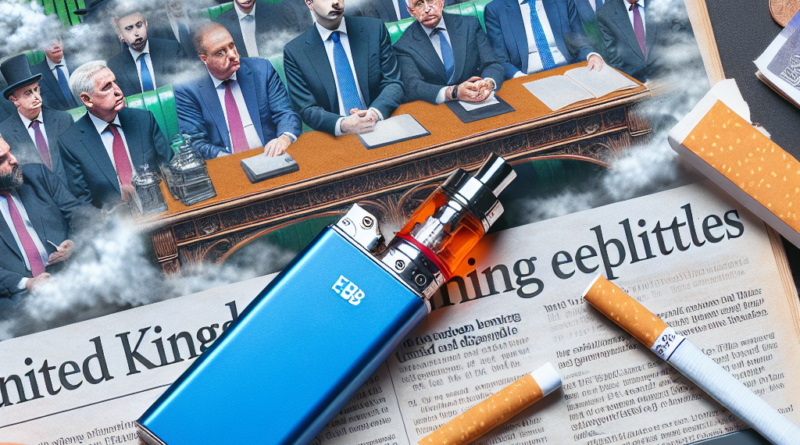UK Implements Ban on Disposable E-Cigarettes: Here’s Why
UK Bans Disposable Vapes: A Major Step Towards Youth Protection and Environmental Safety
The United Kingdom has announced a groundbreaking plan to ban disposable e-cigarettes starting June 2024, aiming to safeguard young people’s health and mitigate environmental damage.
This significant announcement, made on Thursday, October 24, has raised concerns among some vaping industry stakeholders who fear an increase in illegal sales and a rise in the black market.
Colorful disposable vapes have become increasingly popular among youth, with about one in four adolescents aged 11 to 15 in England reportedly having tried vaping.
The British government estimates that approximately five million of these devices are discarded weekly, exacerbating plastic and heavy metal pollution.
The plastic, lead, and mercury contained in these products pose a grave threat to the environment, while lithium-ion batteries present significant hazards for waste management workers.
Through this initiative, the government aims to combat the prevalent “throwaway culture” and promote a cleaner and safer environment for future generations.
Here’s everything you need to know about the upcoming ban in the UK.
Rising Concerns Over Youth Vaping
The prohibition of disposable e-cigarettes comes amidst growing concerns regarding their use among young people.
Statistics indicate a dramatic increase in vaping among adolescents in England, jumping from negligible levels in 2012 to approximately 9.1% of the youth population in 2023.
The vibrant colors and enticing marketing of disposable vapes significantly attract minors, prompting government intervention.
Andrew Gwynne, the public health and prevention minister, emphasized that these vapes are the “preferred product” for young vapers, highlighting the urgent need to shield minors from harmful practices.
The Environmental Impact
The environmental repercussions of disposable e-cigarettes are another crucial factor in the government’s decision.
Estimates suggest that around five million disposable vapes are discarded each week in the UK, leading to a substantial accumulation of toxic waste.
Mary Creagh, the environment minister, stated that these devices “ruin our cities” and contribute to a “throwaway culture” that demands urgent attention.
Consequently, the government has resolved to take decisive action to reduce waste, preventing plastic and heavy metals from contaminating the environment.
Furthermore, the batteries in these electronic devices pose serious fire hazards, necessitating stricter regulations.
Mixed Reactions to the Ban
The responses to the ban on disposable e-cigarettes have been varied.
Advocates of the measure praise the government’s decision as an essential move in combating nicotine use among youth and addressing the climate emergency.
Conversely, critics warn the ban could lead to a surge in illegal sales.
John Dunne, director of the UK Vaping Industry Association, expressed concerns about the potential emergence of a black market, stating that “bans are not the solution,” and advocating for licensing measures for retailers and distributors instead.
Despite the sales prohibition, youth health issues remain central to the discussion.
Selling tobacco products to individuals under 18 is already illegal in the UK, yet the escalating popularity of e-cigarettes among youth necessitates more robust action.
According to the National Health Service, a quarter of adolescents aged 11 to 15 utilized a vape last year, underscoring a troubling trend.
Government ministers recognize the need to ensure a safer environment for youth and hope that the impending ban will significantly lower nicotine usage among young people and encourage greater environmental responsibility.
This bold step into a rapidly evolving sector will have significant repercussions, and it remains to be seen how the market will react and what effects this will have on consumer behavior.

